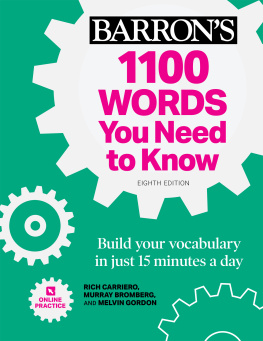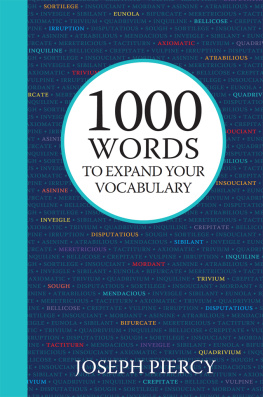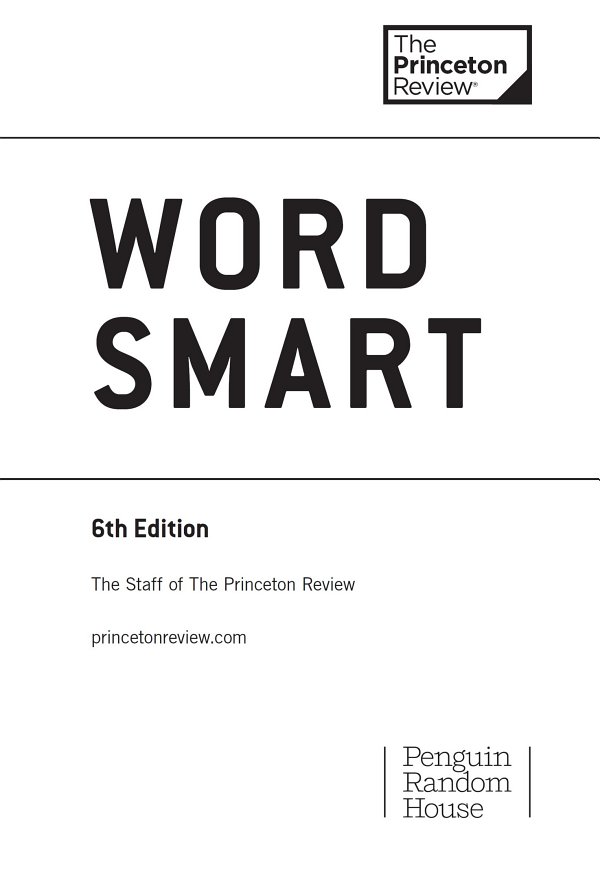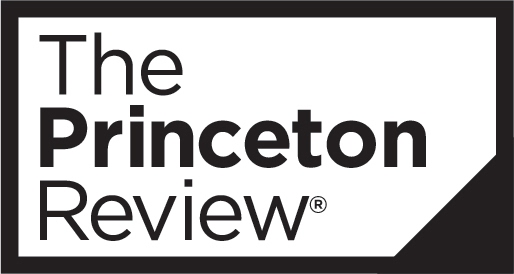Editorial Rob Franek, Editor-in-Chief Casey Cornelius, VP Content Development Mary Beth Garrick, Director of Production Selena Coppock, Managing Editor Meave Shelton, Senior Editor Colleen Day, Editor Sarah Litt, Editor Aaron Riccio, Editor Orion McBean, Associate Editor
Penguin Random House Publishing Team Tom Russell, VP, Publisher Alison Stoltzfus, Publishing Director Jake Eldred, Associate Managing Editor Ellen Reed, Production Manager Suzanne Lee, Designer The Princeton Review 555 West 18th Street New York, NY 10011 Email: editorialsupport@review.com Copyright 2017 by TPR Education IP Holdings, LLC. All rights reserved. Published in the United States by Penguin Random House LLC, New York, and in Canada by Random House of Canada, a division of Penguin Random House Ltd., Toronto. Terms of Service: The Princeton Review Online Companion Tools (Student Tools) for retail books are available for only the two most recent editions of that book. Student Tools may be activated only twice per eligible book purchased for two consecutive 12-month periods, for a total of 24 months of access. Activation of Student Tools more than twice per book is in direct violation of these Terms of Service and may result in discontinuation of access to Student Tools Services.
Trade Paperback ISBN9781524710712 Ebook ISBN9781524710873 The Princeton Review is not affiliated with Princeton University. Editor: Colleen Day Production Editors: Emily Epstein White and Dallin Law Production Artist: Gabriel Berlin Cover art by Shotshop GmbH / Alamy Stock Photo
Cover design by Suzanne Lee v4.1 a
Acknowledgments
The Princeton Review would like to thank Gina Donegan for her fantastic contributions to this edition, as well as Gabriel Berlin, Emily Epstein White, and Dallin Law for their time and attention to each page. Special thanks to Adam Robinson, who conceived of and perfected the Joe Bloggs approach to standardized tests and many of the other successful techniques used by The Princeton Review.
Contents
Register Your Book Online!
Go to
PrincetonReview.com/cracking Youll see a welcome page where you can register your book using the following ISBN: 9781524710873 After placing this free order, youll either be asked to log in or to answer a few simple questions in order to set up a new Princeton Review account. Finally, click on the Student Tools tab located at the top of the screen. It may take an hour or two for your registration to go through, but after that, youre good to go.
If you have noticed potential content errors, please email EditorialSupport@review.com with the full title of the book, its ISBN (located above), and the page number of the error. Experiencing technical issues? Please email TPRStudentTech@review.com with the following information: your full name email address used to register the book full book title and ISBN your computer OS (Mac or PC) and Internet browser (Firefox, Safari, Chrome, etc.) description of technical issue
Find printable lists of essential SAT and GRE vocabulary so you can study on the go Check out articles with valuable advice about college admissions Sort colleges by whatever youre looking for (such as Best Theater or Dorm), learn more about your top choices, and see how they all rank according to
The Best 382 Colleges Check to see if there have been any corrections or updates to this edition
Offline ResourcesMore Word SmartGrammar SmartSAT Power VocabIntroduction
Your Vocabulary Has Been Talking About You Behind Your Back
The words you use say a lot about you. Knowing which words to use and understanding how to use them are both key to communicating effectively and accurately. People often say in frustration, I know what I mean, but I dont know how to say it. If the right words arent there, the right ideas cant get through. Your vocabulary is the foundation of your ability to share your thoughts with other people.
When you improve your vocabulary, you improve your ability to bring your intelligence and ideas to bear on the world around you.
Big Words Arent Necessarily Better
When people say that someone has a good vocabulary, they usually mean that he or she uses a lot of important-sounding wordswords like
jactitation, demulcent, and
saxicolous. But a vocabulary consisting of words like these isnt necessarily a good vocabulary. Why? Because almost no one knows what
jactitation, demulcent, and
saxicolous mean. If you used these words in conversation, chances are no one listening to you would know what you were talking about. Big, difficult words have important uses, but improving a vocabulary involves much more than merely decorating your speech or your writing with a few polysyllabic zingers. The goal of communication is clarity.
We write and speak in order to make ourselves understood. A good vocabulary is one that makes communication easy and efficient. One mark of an effective speaker or writer is his or her ability to express complex ideas with relatively simple words. Most discourse among educated people is built on words that are fairly ordinarywords youve heard before, even if you arent exactly certain what they mean. The best way to improve your vocabulary isnt to comb the dictionary for a handful of tongue twisters to throw at unsuspecting strangers. Instead, you need to hone your understanding of words that turn up again and again in intelligent communication.
A person who had a clear understanding of every word in an issue of the New York Times or the Wall Street Journal would have a powerful vocabularya vocabulary sophisticated enough to impress almost any teacher, admissions officer, colleague, or employer.
Why You Need This Book
An effective vocabulary is one that enables you to convey ideas easily. Do you know what
inveterate means? Do you know the difference between
flaunt and
flout? Do you know why an artist might be insulted if you called his or her work
artful? None of these words is particularly difficult. But each has its own meaning or meanings. If you misuse these words, you communicate that you are in over your head. When people get into trouble with words, it usually isnt because they dont know the meaning of a seldom-used word like
termagant but because they are confused about the meaning of a much more common worda word they hear, read, and even use with regularity.
Take the word peruse, for example. Many people think that it means skim or glance over. But it doesnt. In fact, it means very nearly the opposite. To peruse a document is to read it carefully. The number of words you know is less important than the care you take in learning the ones you really use.
Speaking or writing well doesnt require an enormous vocabularybut it does require a confident one. And the way to gain confidence in your vocabulary is to buckle down and learn the words you need to make yourself clearly understood.
The Princeton Review Approach
The philosophy behind The Princeton Review is simple: We teach what you need to know and try to make it interesting and fun at the same time. In preparing students for various standardized tests, we spend much of our time working on vocabulary. Despite what many people think, many intelligence or aptitude tests are largely tests of vocabulary. The students who earn high scores on such tests are the students who know the right words.












